- Services
Technology Capabilities
Technology Capabilities- Product Strategy & Experience DesignDefine software-driven value chains, create purposeful interactions, and develop new segments and offerings.
- Digital Business TransformationAdvance your digital transformation journey.
- Intelligence EngineeringLeverage data and AI to transform products, operations, and outcomes.
- Software Product EngineeringCreate high-value products faster with AI-powered and human-driven engineering.
- Technology ModernizationTackle technology modernization with approaches that reduce risk and maximize impact.
- Embedded Engineering & IT/OT TransformationDevelop embedded software and hardware. Build IoT and IT/OT solutions.
- Industries
- GlobalLogic VelocityAI
- Insights
BlogsDecember 16, 2024Gene LeybzonAccelerating Digital Transformation with Structured AI Outputs
This code produces the following output that can be imported into the candidate trackin...
 BlogsOctober 30, 2024Yuriy Yuzifovich
BlogsOctober 30, 2024Yuriy YuzifovichAccelerating Enterprise Value with AI
Discover how financial services integrations are transforming from standalone offerings...

- About Us
Press ReleaseGlobalLogicSeptember 23, 2025Hitachi agrees to acquire German data and AI services firm ...
Strengthening GlobalLogic’s data and consulting capabilities and expanding footprint in...
 Press ReleaseGlobalLogicSeptember 10, 2025
Press ReleaseGlobalLogicSeptember 10, 2025GlobalLogic and Ericsson Deploy Private 5G Network at Hitachi ...
The new infrastructure is the digital backbone of the Hagerstown plant, enhancing effic...
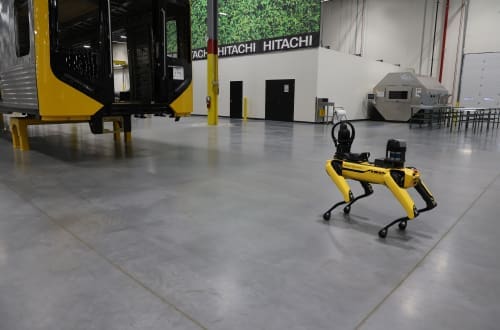
- Careers
Published on November 13, 2025Agentic Automotive in Focus: Top AI Trends from Dreamforce 2025
View all articlesGlobalLogic MarketingShareRelated Content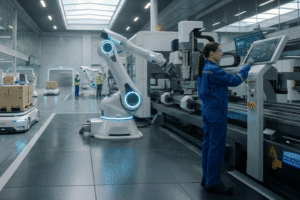 GlobalLogic18 December 2025
GlobalLogic18 December 2025 GlobalLogic1 December 2025View All Insights
GlobalLogic1 December 2025View All Insights GlobalLogic27 November 2025
GlobalLogic27 November 2025Let's start engineering impact together
GlobalLogic provides unique experience and expertise at the intersection of data, design, and engineering.
Agentic AIEnterprise AIMobilityDreamforce 2025 marked a turning point for enterprise AI, signaling a shift from copilots that assist to autonomous agents that act with purpose, precision, and context. For automotive leaders, the message was unmistakable: agentic systems are no longer a future vision but today’s operating model.
In a sector where margins are tight, loyalty is elusive, and connected vehicle data remains underutilized, the ability to delegate decisions across the customer and vehicle lifecycle is fast becoming a competitive requirement. Whether it’s streamlining financing, personalizing service, or turning diagnostics into revenue, agentic AI is beginning to shift the economics of mobility.
GlobalLogic, a Salesforce Summit Partner, joined the conversations on-site at Dreamforce, where the automotive sessions focused less on features and more on strategy. It’s no surprise then that Agentforce’s newest capabilities — end-to-end driver journey templates and embedded diagnostic agents — reflect that shift toward orchestration rather than automation.
We recommend to visit/refer the most important themes from those sessions and connects them to the broader strategic questions automotive leaders are already asking. And also have a look at the insights shared in the latest Gartner® Salesforce Vendor Insight Report as a reference.
Download your copy of the 2025 Gartner Vendor Insight Report: Salesforce Report.
1. The End-to-End Autonomous Agentic Driver Journey
One major theme at Dreamforce this year was the growing ability of AI agents to operate across the full automotive customer lifecycle, not just support isolated touchpoints. This shift toward agentic orchestration is changing how OEMs, finance arms, and dealers think about engagement, operations, and efficiency.
Salesforce’s latest update to Agentforce, including its 360 templates for automotive, illustrates what this looks like in practice. Pre-built agents now span sales, financing, and service, enabling systems to act cohesively on a customer’s behalf. The result is fewer handoffs, less rework, and a continuous thread of context from first click to ownership.
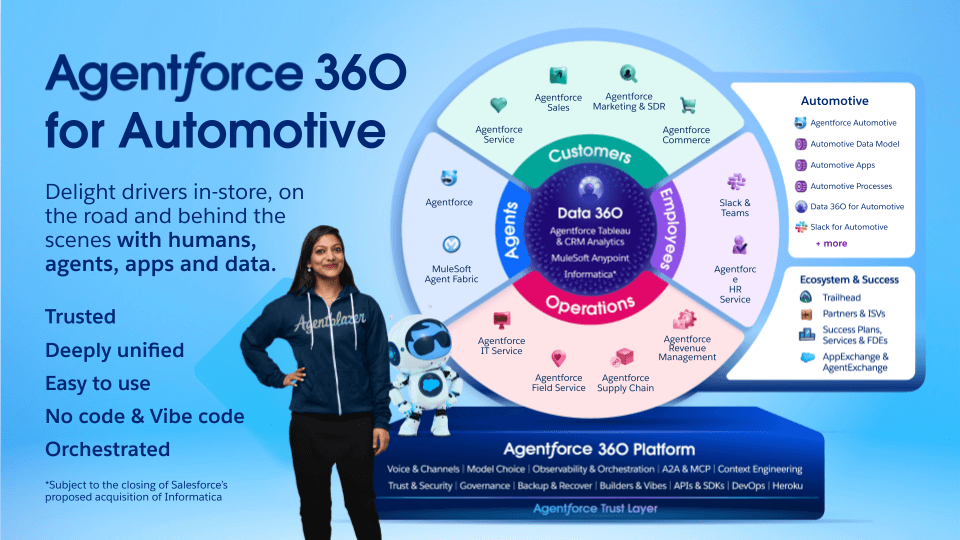
This matters because it addresses two persistent barriers to growth:
- First, it eliminates the friction that customers face when navigating between digital channels and dealership visits.
- Second, it removes the burden of repetitive administrative work from internal teams — freeing finance, contact center, and sales staff to focus on customer outcomes.
We heard how one automaker reduced a multi-hour lemon law and recall process to minutes, for example. Others are using agents to monitor digital touchpoints 24/7, automatically qualifying leads and initiating follow-ups without delay. These aren’t just time savers but margin protectors and experience builders.
The 2025 Gartner Salesforce Vendor Insight Report points out the noteworthy events, key initiatives and activities. The real question is whether these tools can support orchestrated, cross-functional processes with accuracy, trust, and scale. In automotive, that’s becoming a requirement, not a roadmap item.
2. The Data Foundation: Trusted Context Powers Agentic AI
As AI agents assume greater responsibility across the customer lifecycle, one foundational issue has come to the forefront: trust. Specifically, how do you ensure that an AI agent acting on your behalf is doing so with the right context, and without making errors that erode brand equity or introduce risk?
That concern was a recurring theme in automotive sessions at Dreamforce. Whether it’s responding to a service inquiry, explaining financing terms, or interpreting telematics data, agents need to understand the full context behind every interaction. Without it, they guess. And guesses, in this environment, become liabilities.
Salesforce responded to this need by reintroducing Data Cloud (now renamed Data 360) as the central intelligence layer for all Agentforce deployments. More than a rebrand, the shift positions Data 360 as the core substrate that powers agent reasoning across structured and unstructured data. This includes everything from service histories and CRM records to engineering notes, owner manuals, contracts, and vehicle diagnostics.
A core component of Data 360 is Intelligent Context, a feature designed to process complex, unstructured data—such as large vehicle manuals and images—to ensure an agent’s reasoning is grounded and accurate, minimizing the risk of “hallucination” in customer and partner interactions.
This unlocks several immediate use cases for automotive companies. Agents can now pull real-time data from telematics systems to proactively suggest service appointments, verify warranty eligibility, and even generate quotes — all before the customer picks up the phone. These same data streams also empower dealers and service teams with a full diagnostic and service history, reducing back-and-forth and accelerating resolution.
On the trust front, the benefit is just as clear. AI hallucinations don’t come from faulty algorithms but from weak or incomplete context. A unified, governed data foundation is what makes agent behavior predictable, defensible, and audit-ready. That’s especially important for premium OEMs and brand-conscious captives, where a single incorrect response can undermine loyalty and increase exposure.
Again, the 2025 Gartner Salesforce Vendor Insight Report is an important resource here for expert insights.
Data 360 is a step toward meeting that standard. For companies planning to deploy AI agents beyond the lab, it may be a prerequisite.
3. Financing, Collections, and the Shift to Lifetime Vehicle Revenue
A third theme that stood out at Dreamforce was how agentic systems are reshaping automotive revenue not just by optimizing transactions, but by addressing the hidden friction in how vehicles are financed, paid for, and supported long after the sale.
For many OEMs and captives, financing remains a bottleneck. Applications are tedious, trade-ins require manual steps, and approvals often stall because of fragmented systems. On the back end, collections teams must walk a fine line between recovery and relationship, without always having the data to do either effectively.
Among others, Agentforce’s new Vehicle Finance Management and Collections Assistance Templates bring AI agents directly into these pain points. Built on top of Salesforce’s Financial Services Cloud, these agents can now guide customers through financing in real time, fielding application questions, surfacing payment options, and modifying terms based on trade-ins or budget changes. Several use cases at Dreamforce illustrated how these capabilities shorten time to close and reduce customer abandonment.
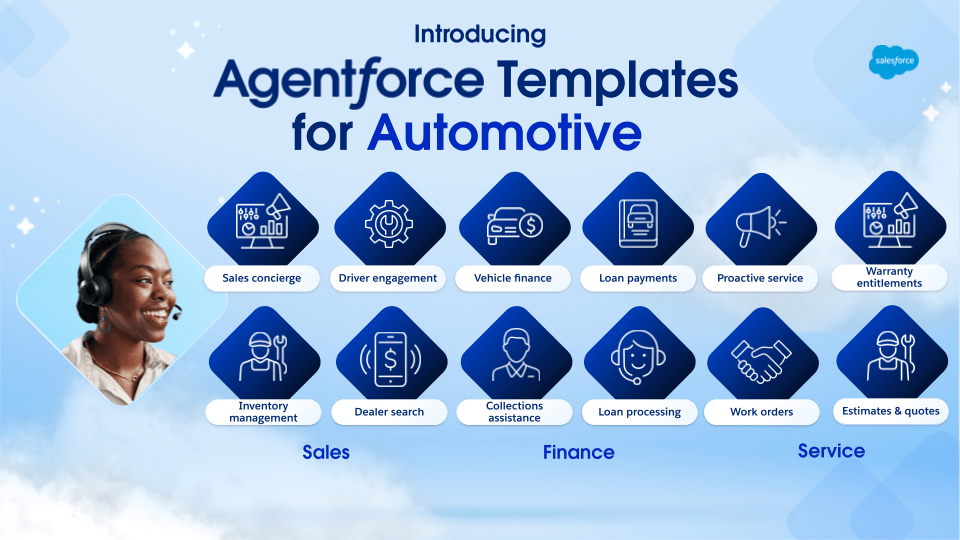
On the collections side, agents take on a more nuanced role. Leveraging Data 360, the Collections Assistance Agent helps teams determine the best outreach strategy based on a customer’s financial profile, engagement history, and product ownership. The goal isn’t just recovery; it’s retention. Preserving the relationship becomes as important as resolving the balance.
But the broader takeaway is strategic. As subscriptions, digital services, and upgrades become core to automakers’ business models, finance can no longer operate as a standalone function. Agents now link financing, service parts, and subscription revenue into a single workflow, enabling automakers to manage the full asset lifecycle as a connected revenue stream.
This shift toward platform unification is critical. As companies evaluate Salesforce’s evolving AI strategy, they’ll need to consider not just the tools available but whether those tools support the long-term transformation of business models. Agentforce’s expansion into automotive finance shows that the foundation is forming and that the opportunity is bigger than accelerating loan approvals. It’s about designing for the next decade of vehicle monetization.
Complementary Agentforce features like Agentforce Grid facilitate high-volume processes by allowing agents to run batch AI workflows at scale, whether for processing dealer invoices or scoring call center quality. Agentforce Script further enhances productivity by enabling agents to autonomously execute complex, multi-step workflows —such as preparing personalized offers or updating CRM records, without human intervention. Furthermore, the forthcoming Agentforce Voice capability will extend the Agentic Enterprise into seamless, 24/7 conversational commerce and service experiences, like instant appointment booking based on connected car data.
Partnering with GlobalLogic to Build Your Agentic Enterprise
The shift to agentic operations is already underway, but realizing its full value requires more than product adoption. It takes an engineering partner who understands how to connect platforms like Salesforce with the realities of mobility, data complexity, and evolving customer expectations.
One clear example of this shift is Katzion, a GlobalLogic company, which was recently recognized with a 2025 Salesforce Partner Innovation Award in Automotive for its work with Audi Singapore. The omnichannel retail platform, built entirely on Salesforce, enables customers to book test drives, purchase vehicles, and arrange financing seamlessly across digital and in-store touchpoints — a live demonstration of agentic orchestration in action.
GlobalLogic brings deep experience in deploying agentic solutions across the automotive ecosystem. With over 600 Salesforce certifications and 4,500 mobility experts worldwide, we help clients turn platform capabilities into measurable outcomes at scale:
- Unifying data across telematics systems, legacy platforms, and CRM/DMS environments to create a single source of truth that supports real-time decision-making.
- Delivering omnichannel digital retailing, including end-to-end vehicle sales, financing, and trade-in capabilities—all embedded with agentic logic.
- Simplifying operations through AI-driven contract management, predictive maintenance, and real-time service orchestration.
Salesforce’s Agentforce strategy is evolving quickly, but not every feature fits every organization. The 2025 Gartner Salesforce Vendor Insight Report is essential reading for automotive leaders.
Download the report to learn about top strengths and challenges. Then let’s talk. A 60-minute working session is all it takes to start mapping the agentic enterprise to your roadmap. As a starting point for moving from strategy to execution, we recommend aligning on a defined plan—a typical first 90 days focuses on launching an initial pilot, establishing core governance, and stabilizing the necessary data foundation.
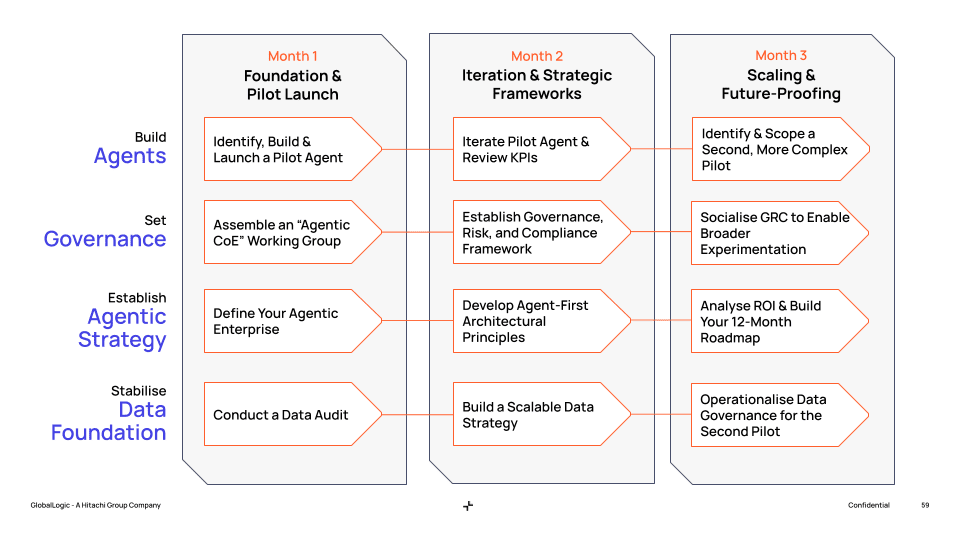 For illustrative purposes only, actual timeline could vary based on the complexity of the pilot program and data quality
For illustrative purposes only, actual timeline could vary based on the complexity of the pilot program and data qualityYou might also like:
- From Modernization to Reinvention: Agentic AI for the Intelligent Enterprise – POV
- GlobalLogic and Salesforce – Accelerating Online Car Sales
- Revolutionizing Customer Retention with Scalable Automation
Gartner, Vendor Insight Report: Salesforce, By Kyle Davis, Olive Huang, 3 September 2025
GARTNER is a registered trademark and service mark of Gartner, Inc. and/or its affiliates in the U.S. and internationally and is used herein with permission. All rights reserved. Gartner does not endorse any vendor, product or service depicted in its research publications, and does not advise technology users to select only those vendors with the highest ratings or other designation. Gartner research publications consist of the opinions of Gartner’s research organization and should not be construed as statements of fact. Gartner disclaims all warranties, expressed or implied, with respect to this research, including any warranties of merchantability or fitness for a particular purpose.
Download the Report
 How can I help you?
How can I help you?
Hi there — how can I assist you today?
Explore our services, industries, career opportunities, and more.
Powered by Gemini. GenAI responses may be inaccurate—please verify. By using this chat, you agree to GlobalLogic's Terms of Service and Privacy Policy.
